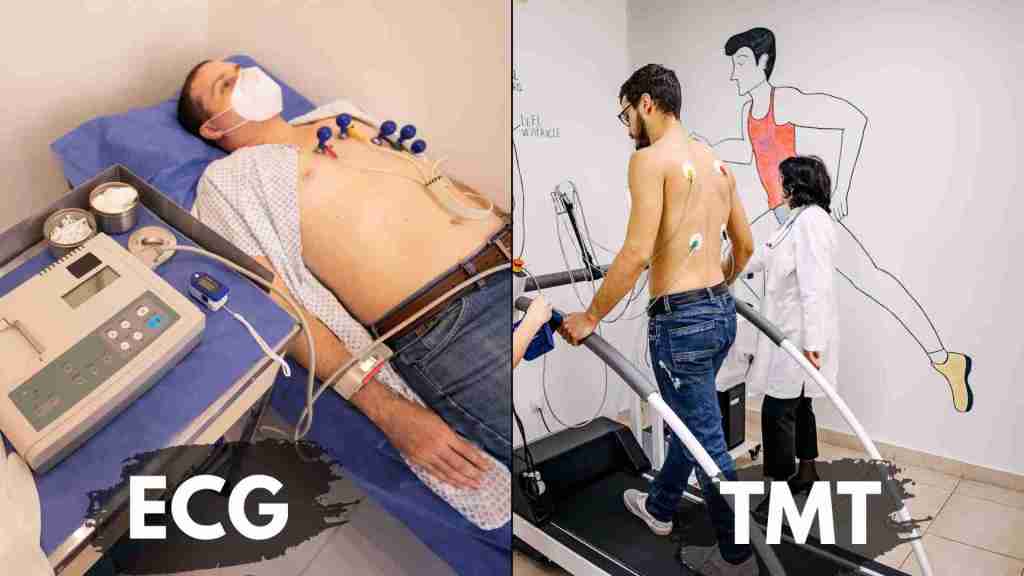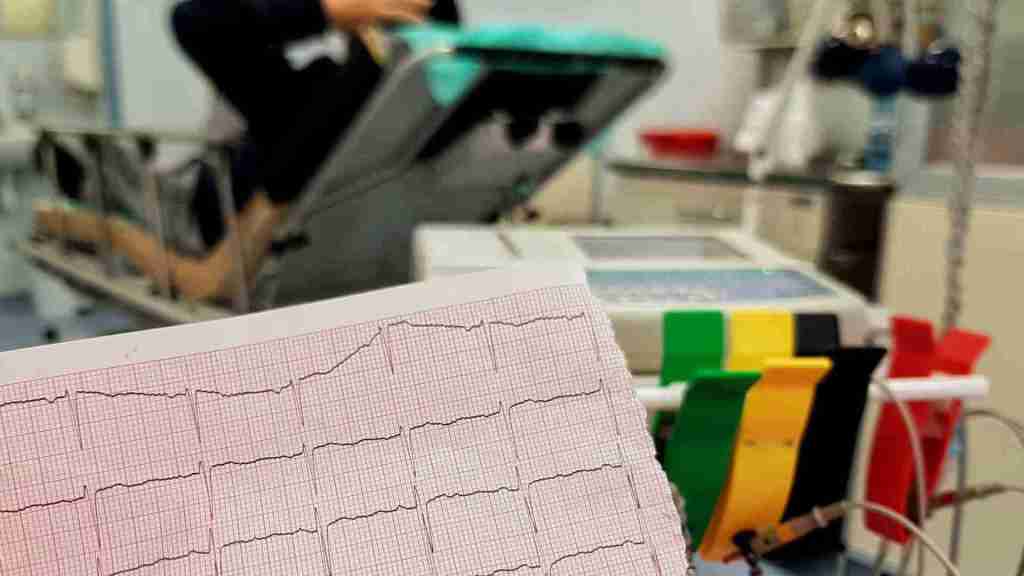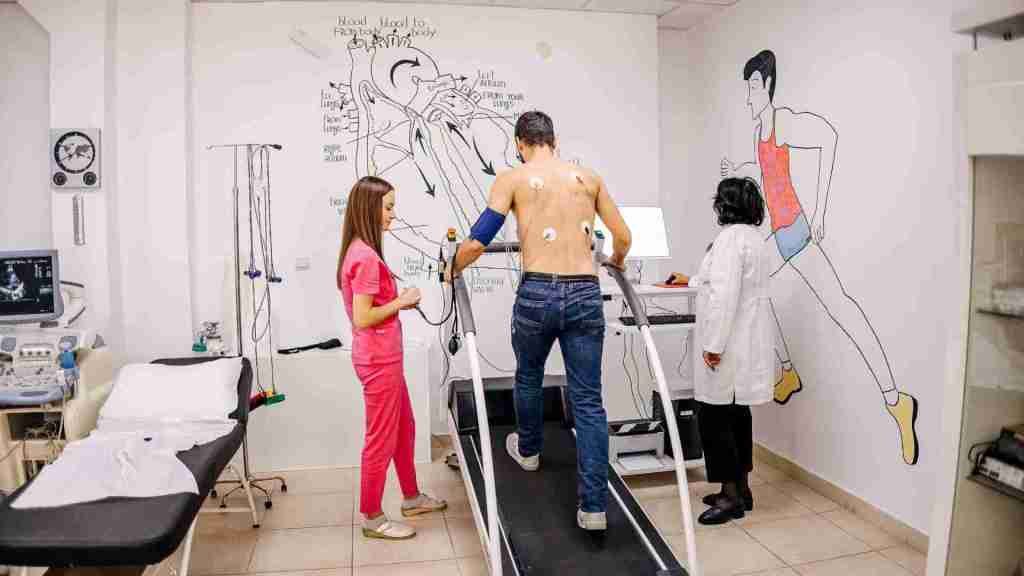If you’ve been advised to undergo ECG or TMT tests, you may wonder which is better for your situation. In this article, we’ll explore everything about ECG vs TMT, their indications, how they are performed, and the limitations of each test, and help you understand which one may be better for you. So sit back and let us guide you through the fascinating realm of cardiac testing.
How are these investigations done, and how long it takes?
ECG and TMT investigations typically take a short time to complete and are non-invasive procedures. An ECG involves placing electrodes on your chest, arms, and legs to record the electrical activity of your heart, which takes about 5 to 10 minutes to perform. A TMT test is a bit more involved, as it requires walking on a treadmill while connected to an ECG machine and gradually increasing the speed and incline of the treadmill. A TMT test typically lasts for around 15 to 20 minutes but can take longer, depending on your physical fitness level and the specific protocol of the test.

What are the indications of ECG and TMT?
ECG and TMT tests have different indications and evaluate various aspects of heart health.
An ECG is a helpful tool for recognizing cardiac rhythm anomalies such as arrhythmias and the presence of heart illness or damage, like a heart attack. It can also access the efficiency of heart medications or diagnose causes of chest pain or discomfort.
On the other hand, TMT tests are typically recommended for patients with symptoms suggestive of coronary artery diseases, such as chest pain or shortness of breath, but who have a normal resting ECG. The test can assist in identifying abnormal changes in heart rate, rhythm, and blood pressure during exercise, which may point to decreased cardiac blood flow.
What are the limitations of ECG and TMT?
While ECG and TMT tests are helpful diagnostic tools, they have certain limitations.
Limitations of ECG:
- Provides a snapshot of heart activity at a particular moment in time
- May not always detect intermittent or hidden heart conditions
- May produce false-positive or false-negative results due to poor electrode placement or interference from other electrical sources
Limitations of TMT:
- Not appropriate for certain patients with physical disabilities or joint problems that limit their ability to exercise
- It may produce false-positive or false-negative results in some cases
- Not always able to identify the specific location or severity of any blockages in the coronary arteries.

Differences between ECG and TMT
Here are the key differences between ECG and TMT:
ECG:
- It is a non-invasive test that measures the heart’s electrical activity.
- It typically takes around 5 minutes to complete.
- It provides a snapshot of heart activity at a particular moment.
- It is used to detect heart rhythm abnormalities and identify the presence of heart disease or damage.
- It may not always detect intermittent or hidden heart conditions.
TMT:
- It involves walking or running on a treadmill while connected to ECG electrodes
- It typically takes around 15 to 20 minutes to complete
- Evaluates heart response to physical activity
- It is used to identify abnormal changes in heart rate, rhythm, and blood pressure that may indicate a reduced blood flow to the heart.
- It may not be appropriate for certain patients with physical disabilities or joint problems that limit their ability to exercise.

Which is better, ECG s TMT?
An ECG may be the best initial test for individuals experiencing symptoms like chest discomfort, breathlessness, or palpitations. It may be done at the workplace or the emergency room. It can be done while you’re at rest or working out. An ECG is more cost-effective for certain patients since it is less costly than a TMT.
In contrast, a TMT is recommended for individuals with risk factors for heart disease, such as high blood pressure, high cholesterol, or genetic heart diseases. It is more sensitive than an ECG in detecting underlying heart disease, especially in patients with mild to moderate blockages. Moreover, TMT can diagnose MI, but ECG cannot.
However, a TMT is more expensive than an ECG and necessitates skilled workers and specialized equipment, which may limit its use for some patients.
ECG vs TMT: Price
The cost of an ECG or TMT in India may vary depending on the location and the healthcare provider. However, generally speaking, an ECG is less expensive than a TMT.
- The cost of an ECG generally ranges from INR 200 to INR 800. You can get your ECG done in 200 INR from H.O.D
- The cost of a TMT is typically higher than an ECG. It can range from INR 1500 to INR 2000 or more. H.O.D has set some good price of TMT test.

What if ECG is normal and TMT is positive?
If an ECG is normal and TMT is positive, it could indicate an underlying problem with blood flow to the heart during physical activity, which is not evident at rest. This is known as ischemia, a condition in which the blood flow to the heart is reduced or blocked and can be caused by narrowed or blocked arteries. It’s important to note that a positive TMT test doesn’t necessarily mean a significant blockage. But it warrants further evaluation to determine the underlying cause.
In such cases, the healthcare provider may recommend additional tests such as a coronary angiogram or a cardiac CT scan to visualize the heart’s blood vessels and assess any blockages.
Why does TMT followed by ECG?
The TMT test evaluates how the heart reacts to physical exertion. This test progressively raises the heart rate to detect abnormal cardiac function alterations that might not be seen at rest.
The TMT is typically followed by an ECG to obtain a resting baseline measurement of the heart’s electrical activity. This is done to compare the results of the TMT to the patient’s resting heart activity. The ECG can help identify any underlying heart rhythm abnormalities or other issues that may affect the interpretation of the TMT results.
In addition, the ECG can also be used to evaluate the patient’s heart health beyond the stress test. It offers a baseline measurement that may be used to track variations in the patient’s heart activity over time and can assist in identifying any existing cardiac problems or damage.
Let’s wrap it up in a table comparing ECG vs TMT
| ECG | TMT | |
| Meaning | Electrocardiogram | Treadmill Test |
| Differences | Records electrical activity of the heart | Measures the heart’s response to exercise |
| Indications | Detect heart problems | Assess heart function during exercise |
| Limitations | Limited ability to detect underlying heart disease | False-positive results may require further testing |
| Better for | Diagnosing heart rhythm abnormalities | Detecting mild to moderate blockages |
| Price (approx.) | INR 200 – INR 800 | INR 1500 – INR 2000 |
Have a Doubts? Book Online Consultancy.
If You are having any doubt then you can book a free online consultancy directly with me, and I will surely guide you. I am Dr. Arshad – MBBS, MRCS ( England ). Just let me know and I will do everything possible to solve your doubts or will guide you.




